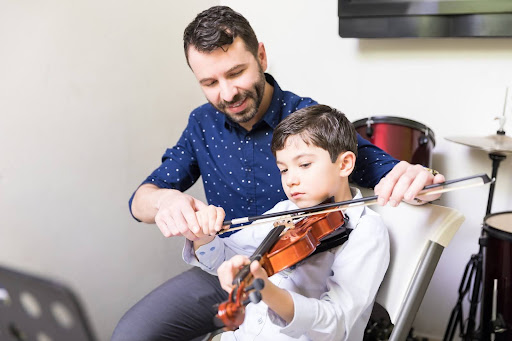Introduction: The Transformative Power of Music
Music is a universal language that transcends boundaries and touches the depths of our souls. Playing a musical instrument is not just an enjoyable pastime; it’s a transformative journey that offers many benefits. The benefits are remarkable, from reducing stress to boosting self-confidence, enhancing memory, fostering creativity, improving academic performance, and enriching your social life. Whether you’re a seasoned musician or a novice eager to begin your musical adventure, the rewards are accessible to all.
Discover the benefits of learning an instrument and how music can be a key to unlocking your full potential and enriching your life. Join us on this harmonious journey to explore the ten incredible benefits of learning a musical instrument.
1. Playing an Instrument Relieves Stress
In our fast-paced world, stress has become an almost constant companion. The strains of work, daily responsibilities, and unexpected challenges can affect our mental and emotional well-being, and this is where playing a musical instrument comes to the rescue as a powerful stress reliever.
Something magical happens when you immerse yourself in the world of music, whether strumming a guitar, tickling the ivories of a piano or drawing the bow across the strings of a violin. The worries of the day melt away as you focus on creating beautiful melodies. Playing an instrument allows you to channel your emotions and find solace in the harmonious sounds you produce.
Moreover, playing music has a scientifically proven ability to lower cortisol levels, the primary stress hormone. As you play, your body releases endorphins, often called “feel-good” hormones, which counteract the effects of stress. This natural mood booster can leave you feeling more relaxed, centered, and better equipped to face life’s challenges. By incorporating the practice of playing a violin or any musical instrument into your daily routine, you can proactively manage stress and cultivate a more balanced and peaceful state of mind.
2. Strengthen Self-Confidence

Learning to play a musical instrument is not just about mastering notes and melodies; it’s also a journey of self-discovery and personal growth. One of the remarkable health benefits it offers is the strengthening of self-confidence. Whether tackling a complex piece, overcoming stage fright, or persevering through moments of frustration, every step forward is a confidence-building experience. These small victories accumulate over time, leading to a profound transformation in how you perceive yourself. Playing a musical instrument demands dedication and practice. Witnessing your progress and the ability to perform pieces you once thought were beyond your reach boosts your self-esteem. You start believing in your capabilities not just as a musician but in other aspects of your life as well.
Moreover, as you gain proficiency, you might share your musical talents with others. Performing in front of an audience, whether in a small gathering or on a larger stage, further enhances your self-confidence. The applause and appreciation from your listeners reaffirm your skills and bolster your self-worth. This newfound self-confidence can ripple effect on various aspects of your life, from your career to social interactions. It’s a quality that radiates and inspires those around you.
3. Cultivates Patience and Perseverance
Learning a musical instrument is a journey that teaches valuable life skills, including patience and perseverance. It’s common to face challenging pieces or encounter difficulties in mastering techniques. However, these moments are growth opportunities. As you practice regularly and confront obstacles, you learn the art of patience. You understand that progress may be gradual, but each effort contributes to your overall development. This patience extends beyond your musical pursuits and becomes a life skill that helps you navigate challenges in various areas. Perseverance is another quality that blossoms through music. When faced with a complex composition or a stubborn technique, the determination to overcome it drives you forward. This persistence in the face of adversity becomes a powerful trait you can apply to any endeavor. Cultivating patience and perseverance through musical training enhances your abilities and strengthens your character.
4. Improves Academic Performance

The benefits of learning a musical instrument extend far beyond the realm of music itself. One notable advantage is the positive impact it can have on academic performance. Studies have shown a strong correlation between music education and enhanced cognitive abilities. When you engage with an instrument, you’re sharpening your concentration and memory skills. This newfound focus can translate into improved academic performance, especially in subjects that require attention to detail and problem-solving. Moreover, the discipline needed for regular practice schedules can instill effective time-management habits, allowing students to balance their studies efficiently.
5. Gives You a Sense of Achievement
Learning to play a musical instrument is a journey filled with milestones and accomplishments. When you master a new piece or technique, you experience a sense of achievement and pride. These moments of success boost your self-esteem and self-confidence. By playing piano or cellos, you enjoy the pleasure of creating music and the satisfaction of personal growth. This newfound self-assurance can positively ripple effect on everyday life, from social interactions to professional endeavors.
6. Boosts Creativity
Playing a musical instrument is a gateway to unlocking your creative potential. Whether composing your melodies or interpreting a piece of music requires imagination and innovation. Musicians often find themselves exploring new ideas, experimenting with sounds, and pushing the boundaries of their artistic expression. This creative stimulation transcends the realm of music, seeping into other aspects of your life. You’ll discover that problem-solving becomes more intuitive, and your ability to think outside the box improves. Embrace the musical journey, and you’ll find your creativity flourishing.
7. Improves Your Memory
Learning to play a musical instrument is like giving your memory a workout at the gym. It requires you to remember notes, chords, rhythms, and sequences. This mental exercise strengthens your memory and cognitive abilities. Musicians have enhanced memory skills, both short-term and long-term. As you practice and commit musical pieces to memory, you’re training your brain to become more efficient at retaining information. These memory benefits can extend to other areas of your life, such as academics and daily tasks, making learning an instrument a powerful cognitive tool.
8. Develops Concentration
Playing a musical instrument demands unwavering focus and concentration. Whether you’re reading sheet music, coordinating your fingers, or listening to the nuances of your performance, you’re continually honing your concentration skills. This enhanced ability to concentrate doesn’t just apply to music; it carries over to other aspects of life. Students who learn to play stringed musical instruments often show improved concentration in the classroom, leading to better academic performance. Additionally, heightened concentration can boost productivity and effectiveness in various professional settings. By investing time in learning an instrument, you’re investing in your ability to stay focused and perform at your best in all areas of life.
9. Increases Time-Management Skills
Learning a musical instrument requires consistent practice and dedication. To progress, you must allocate time for practice sessions amidst your daily commitments. This process instills valuable time-management skills. Musicians become adept at setting aside specific time slots for practice, ensuring they balance their musical pursuits with work, studies, and other responsibilities. This skill of prioritization and time allocation extends to various aspects of life, helping individuals become more organized and efficient. By learning an instrument, you’re not just mastering melodies; you’re mastering time management, a skill that proves invaluable in achieving success in all your endeavors.
10. Improves Your Social Life
Music has a universal language that brings people together. When you learn a musical instrument, you open doors to new social connections. Whether joining a band orchestra or simply jamming with friends, making music is a shared experience that fosters friendships and a sense of belonging.
Playing an instrument also provides opportunities to perform in front of an audience, as this boosts your confidence and allows you to connect with others on a deeper level through the emotions conveyed in your music. The bonds formed in musical communities can last a lifetime, enriching your social life and enhancing your overall well-being.
Conclusion: Striking a Chord with a Fulfilling Life
Learning a musical instrument isn’t just about mastering the notes; it’s about mastering life. The benefits of this journey extend far beyond the instrument itself. From relieving stress to enhancing social connections and boosting creativity to improving memory, the path of music enriches every aspect of your existence.
So, why wait? Head to our violin store in Atlanta and take the first step in this harmonious journey today. Discover the joy, the growth, and the fulfillment that comes with embracing the world of music. Start your musical adventure and let it resonate through every chord of your life.
